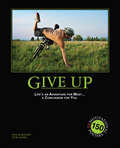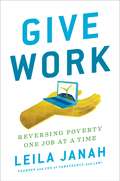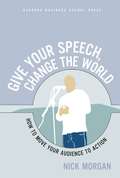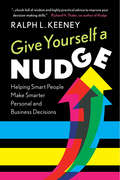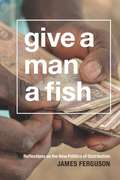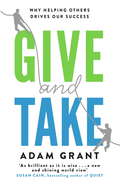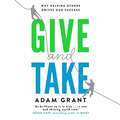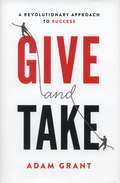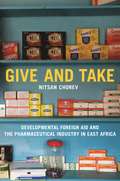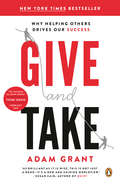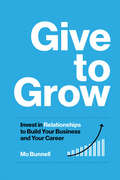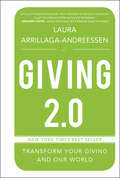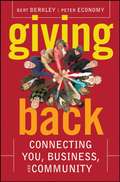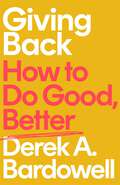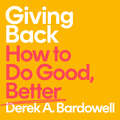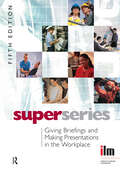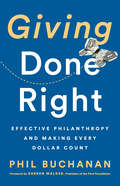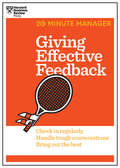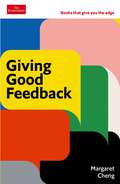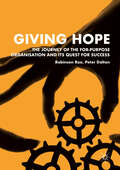- Table View
- List View
Give Up: 150 Demotivation Posters
by Paul Koehorst Ivor JonesDo sugar-coated lies and cliché photos actually motivate you to do better? Of course not! If you want to get ahead in life, you need to know how things really work. You need posters that reveal the cold, hard truth. You need to be demotivated. By offering demotivational messages accompanied by ridiculous images, the author turns the motivational message upside down with very funny results. Faux versions of the kitschy motivational poster are already a wildly popular Internet phenomenon, but never have they been done with such savage humor as in this book. The author offers a variety of entertaining options, such as a baseball player eating dirt while missing a fly ball paired with the caption "Humiliation: There's no Point Trying, You Just Look Ridiculous." Another poster pairs a distressed surgeon with, "Failure: Sometimes it is a Matter of Life and Death."
Give Us a 'C'! Killing Knock-offs with Copyright?
by Lena G. GoldbergVarsity Brands, the leading manufacturer of cheerleading uniforms in the U.S., obtained copyright protection for certain designs of stripes, chevrons, color blocks and lines on cheerleading uniforms. Star Athletica, a newcomer in the field, used those designs in its own uniforms and was promptly sued by Varsity for copyright infringement. Star countered that cheerleading uniforms were useful articles and, as such, were excluded from copyright protection. In a case that went all the way to the U.S. Supreme Court, the issue of whether certain designs of or on a useful article were sufficiently separable from the article's utilitarian aspects. If they were separable, then they may be eligible for copyright protection. The outcome of the case could provide the more than $300 billion U.S. fashion industry with long sought protection from knock-offs.
Give Work: Reversing Poverty One Job at a Time
by Leila JanahWant to end poverty for good? Entrepreneur and Samasource founder Leila Janah has the solution—give work, not aid. “An audacious, inspiring, and practical book. Leila shows how it’s possible to build a successful business that lifts people out of poverty—not by giving them money but by giving them work. It’s required reading for anyone who’s passionate about solving real problems.” —Adam Grant, author of Give and Take and Originals Despite trillions of dollars in Western aid, 2.8 billion people worldwide still struggle in abject poverty. Yet the world’s richest countries continue to send money—mostly to governments—targeting the symptoms, rather than the root causes of poverty. We need a better solution. In Give Work, Leila Janah offers a much-needed solution to solving poverty: incentivize everyone from entrepreneurs to big companies to give dignified, steady, fair-wage work to low-income people. Her social business, Samasource, connects people living below the poverty line—on roughly $2 a day—to digital work for major tech companies. To date, the organization has provided over $10 million in direct income to tens of thousands of people the world had written off, dramatically altering the trajectory of entire communities for the better. Janah and her team go into the world’s poorest regions—from refugee camps in Kenya to the Mississippi Delta in Arkansas—and train people to do digital work for companies like Google, Walmart, and Microsoft. Janah has tested various Give Work business models in all corners of the world. She shares poignant stories of people who have benefited from Samasource’s work, where and why it hasn’t worked, and offers a blueprint to fight poverty with an evidence-based, economically sustainable model. We can end extreme poverty in our lifetimes. Give work, and you give the poorest people on the planet a chance at happiness. Give work, and you give people the freedom to choose how to develop their own communities. Give work, and you create infinite possibilities.
Give Your Speech, Change the World
by Nick MorganDo you remember the topic of the last speech you heard? If not, you're not alone. In fact, studies show that audiences remember only 10% to 30% of speech or presentation content. Given those bleak statistics, why do we give speeches at all? We give them, says communications expert Nick Morgan, because they remain the most powerful way of connecting with audiences since ancient Greek times. But as we've evolved to a more conversational mode of public speaking, thanks to television, we have forgotten much of what the Greeks taught us about the nonverbal aspects of speech-giving: the physical connection with audiences that can create an almost palpable emotional bond. Morgan says this "kinesthetic connection" comes from truly listening to your audience-not just with your brain but with your body. In this book, he draws from more than 20 years as a speech coach and consultant, combining the best of ancient Greek oratory with modern communications research to offer a new, audience-centered approach to public speaking. Through entertaining and insightful examples, Morgan illustrates a 3 part process-focusing on content development, rehearsal, and delivery-that will enable readers of all experience levels to give more effective, passion-filled speeches that move audiences to action.
Give Yourself a Break: The Power of Self-Compassion
by Serena ChenWhen we experience a setback at work, we tend to either become defensive and blame others, or berate ourselves. Neither response is helpful. Shirking responsibility by getting defensive may alleviate the sting of failure, but it comes at the expense of learning. Self-flagellation, on the other hand, may feel warranted in the moment, but it can lead to an inaccurately gloomy assessment of one's potential, which undermines personal development. Research shows that we should respond instead with self-compassion. People who do this tend to demonstrate three behaviors: First, they are kind rather than judgmental about their own failures and mistakes; second, they recognize that failures are a shared human experience; and third, they take a balanced approach to negative emotions when they stumble or fall short--they allow themselves to feel bad, but they don't let negative emotions take over. Self-compassion boosts performance by triggering the "growth mindset"--the belief that improvement is achievable through dedication and hard work. It also helps us connect with a more authentic self.
Give Yourself a Nudge: Helping Smart People Make Smarter Personal and Business Decisions
by Ralph L. KeeneyThe best way to improve your quality of life is through the decisions you make. This book teaches several fundamental decision-making skills, provides numerous applications and examples, and ultimately nudges you toward smarter decisions. These nudges frame more desirable decisions for you to face by identifying the objectives for your decisions and generating superior alternatives to those initially considered. All of the nudges are based on psychology and behavioral economics research and are accessible to all readers. The new concept of a decision opportunity is introduced, which involves creating a decision that you desire to face. Solving a decision opportunity improves your life, whereas resolving a decision problem only restores the quality of your life to that before the decision problem occurred. We all can improve our decision-making and reap the better quality of life that results. This book shows you how.
Give a Man a Fish: Reflections on the New Politics of Distribution
by James FergusonThe author in this book examines the rise of social welfare programs in southern Africa, in which states make cash payments to their low income citizens.
Give and Take: A Revolutionary Approach to Success
by Adam GrantThe New York Times bestseller'Brimming with life-changing insights' Susan Cain, author of Quiet'Excellent' Financial TimesEverybody knows that hard work, luck and talent each plays a role in our working lives. In his landmark book, Adam Grant illuminates the importance of a fourth, increasingly critical factor - that the best way to get to the top is to focus on bringing others with you.Give and Take changes our fundamental understanding of why we succeed, offering a new model for our relationships with colleagues, clients and competitors. Using his own cutting-edge research as a professor at Wharton Business School, as well as success stories from Hollywood to history, Grant shows that nice guys need not finish last. He demonstrates how smart givers avoid becoming doormats, and why this kind of success has the power to transform not just individuals and groups, but entire organisations and communities.
Give and Take: A Revolutionary Approach to Success
by Adam GrantFrom the audio bestselling author of THINK AGAIN and ORIGINALS. Why givers - not takers or matchers - win big. Perfect for anyone who enjoyed QUIET or THINKING FAST AND SLOW.The motivations behind today's most successful leaders and entrepreneurs come to a simple yet decisive explanation: there are people who give, people who take, people who match, and people who fake. Our world is filled with these givers, takers, matchers and fakers. Amazingly, those who succeed (not only personally but for their clients and companies) don't take or match. They give. (Although they're not necessarily philanthropic.)GIVE AND TAKE presents the fascinating secrets to givers' success. The results are unequivocal: givers gain big. Jack Welch, Richard Branson, Jon Huntsman Sr. - all of them are givers. In a world in which so many takers such as Bernard Madoff and Raj Rajaratnam have ruined lives and reputations, this book will reassure readers that the real power lies in becoming a giver. Since the vast majority of people aren't born givers, Grant not only presents the case for why givers win, he also offers their hidden strategies for winning.Read by Adam Sims(p) Orion Publishing Group 2018
Give and Take: A Revolutionary Approach to Success
by Adam M. GrantAn innovative, groundbreaking book that will captivate readers of Malcolm Gladwell, Daniel Pink, The Power of Habit, and Quiet. For generations, we have focused on the individual drivers of success: passion, hard work, talent, and luck. But today, success is increasingly dependent on how we interact with others. It turns out that at work, most people operate as either takers, matchers, or givers. Whereas takers strive to get as much as possible from others and matchers aim to trade evenly, givers are the rare breed of people who contribute to others without expecting anything in return. Using his own pioneering research as Wharton's youngest tenured professor, Grant that shows these styles have a surprising impact on success. Although some givers get exploited and burn out, the rest achieve extraordinary results across a wide range of industries. Combining cutting-edge evidence with captivating stories, this landmark book shows how one of America's best networkers developed his connections, why the creative genius behind one of the most popular shows in television history toiled for years in anonymity, how a basketball executive responsible for multiple draft busts transformed his franchise into a winner, and how we could have anticipated Enron's demise four years before the company collapsed--without ever looking at a single number. Praised by bestselling authors such as Dan Pink, Tony Hsieh, Dan Ariely, Susan Cain, Dan Gilbert, Gretchen Rubin, Bob Sutton, David Allen, Robert Cialdini, and Seth Godin--as well as senior leaders from Google, McKinsey, Merck, Estée Lauder, Nike, and NASA-- Give and Take highlights what effective networking, collaboration, influence, negotiation, and leadership skills have in common. This landmark book opens up an approach to success that has the power to transform not just individuals and groups, but entire organizations and communities.
Give and Take: Developmental Foreign Aid and the Pharmaceutical Industry in East Africa (Princeton Studies in Global and Comparative Sociology)
by Nitsan ChorevGive and Take looks at local drug manufacturing in Kenya, Tanzania, and Uganda, from the early 1980s to the present, to understand the impact of foreign aid on industrial development. While foreign aid has been attacked by critics as wasteful, counterproductive, or exploitative, Nitsan Chorev makes a clear case for the effectiveness of what she terms “developmental foreign aid.”Against the backdrop of Africa’s pursuit of economic self-sufficiency, the battle against AIDS and malaria, and bitter negotiations over affordable drugs, Chorev offers an important corrective to popular views on foreign aid and development. She shows that when foreign aid has provided markets, monitoring, and mentoring, it has supported the emergence and upgrading of local production. In instances where donors were willing to procure local drugs, they created new markets that gave local entrepreneurs an incentive to produce new types of drugs. In turn, when donors enforced exacting standards as a condition to access those markets, they gave these producers an incentive to improve quality standards. And where technical know-how was not readily available and donors provided mentoring, local producers received the guidance necessary for improving production processes.Without losing sight of domestic political-economic conditions, historical legacies, and foreign aid’s own internal contradictions, Give and Take presents groundbreaking insights into the conditions under which foreign aid can be effective.
Give and Take: Why Helping Others Drives Our Success
by Adam M. GrantA groundbreaking look at why our interactions with others hold the key to successFor generations, we have focused on the individual drivers of success: passion, hard work, talent, and luck. But in today's dramatically reconfigured world, success is increasingly dependent on how we interact with others. In Give and Take, Adam Grant, an award-winning researcher and Wharton's highest-rated professor, examines the surprising forces that shape why some people rise to the top of the success ladder while others sink to the bottom. Praised by social scientists, business theorists, and corporate leaders, Give and Take opens up an approach to work, interactions, and productivity that is nothing short of revolutionary.
Give the Work Back (The Importance of Empowering Others to Achieve Difficult Goals)
by Marty Linsky Ronald A. HeifetzOften a leader's tendency is to take problems or challenges onto him- or herself and come up with solutions. It's much harder to empower people to develop and own solutions to the problems in the group or organization, but this is crucial in order for the solutions to work. This chapter outlines ways to effectively intervene while keeping the locus of responsibility and action where it belongs. This chapter was originally published as Chapter 6 of "Leadership on the Line."
Give to Grow: Invest in Relationships to Build Your Business and Your Career
by Mo BunnellRelationships are the foundation of our long-term business success. <P><P> The problem is a million things get in the way: <P><P> “I don’t have enough time.”<br> “I don’t want to be a nag.”<br> “They are super busy right now.”<br> And the biggest one—“I’m just not good at this.” <P><P> There’s a simple solution to breaking through all this noise: Giving. <P><P> When you focus on giving, you will remove your own mental roadblocks. You’ll be centered on solving the client’s problems and investing in their success. And you can build a system to consistently integrate the right moves into your busy work life. <P><P> The real magic to this approach: It’s always your move, and there’s always a way to be helpful. In Give to Grow, Mo Bunnell shows how to develop the growth mindset that keeps the focus on the relationship.
GiveDirectly
by Brian J. Hall Tiffany Y. Chang John Beshears Joshua SchwartzsteinHow should nonprofits design compensation systems to attract and retain talent? GiveDirectly is a respected charitable organization with an unconventional approach. Instead of spending on traditional aid programs in areas such as health care and food access in developing countries, GiveDirectly transfers cash directly to the poor. As experiments have shown this approach to be an effective and efficient way to improve recipients’ life satisfaction, the organization has attracted considerable attention among donors and the media. Now, GiveDirectly is looking to grow, and it is contemplating how best to recruit talented employees and keep them motivated. In addition to offering salaries competitive with the private sector, GiveDirectly is considering linking employee compensation to organizational goals regarding the amount of cash transferred—an unusual strategy for a nonprofit.
Giving 2.0
by Laura Arrillaga-AndreessenGold Medal Winner; Philanthropy, Charities, and Nonprofits; 2012 Axiom Business Book Awards Giving 2.0 is the ultimate resource for anyone navigating the seemingly infinite ways one can give. The future of philanthropy is far more than just writing a check, and Giving 2.0 shows how individuals of every age and income level can harness the power of technology, collaboration, innovation, advocacy, and social entrepreneurship to take their giving to the next level and beyond. Major gifts may dominate headlines, but the majority of giving still comes from individual households--ordinary people with extraordinary generosity. Even in 2009, at a time of deep recession, individual giving averaged almost $2,000 per household and drove 82% of the $300 billion donated that same year. Based on her vast experience as a philanthropist, academic, volunteer, and social innovator, Arrillaga-Andreessen shares the most effective techniques she herself pilots and studies and a vast portfolio of lessons learned during her lifetime of giving. Featuring dozens of stories on innovative and powerful methods of how individuals give time, money, and expertise--whether volunteering and fundraising, leveraging technology and social media, starting a giving circle, fund, foundation, or advocacy group, or aspiring to create greater social impact--Giving 2.0 shows readers how they can renew, improve, and expand their giving and reach their fullest potential. A practical, entertaining, and inspiring call to action, Giving 2.0 is an indispensable tool for anyone passionate about creating change in our world.
Giving Back: Connecting You, Business, and Community
by Bert Berkeley Peter EconomyThere is something exciting happening in businesses across the country. More business-people and more companies than ever are participating in charitable activities and are learning that giving back is not a slogan--it is a way of doing business and a way of life. Giving Back reveals how fundamental and lasting changes are being accomplished in communities and highlights highly effective organizations from a number of major metropolitan areas, including Kiva.org, Horizons for Homeless Children, the Annie E. Casey Foundation, LINC, Stonyfield Farm Profits for the Planet, and many more. -amazon.com
Giving Back: How to Do Good, Better
by Derek A. BardowellDo you wish you could do more to change the world but don't know how? Do you ever look around at the many charities asking for donations and feel overwhelmed? This inspiring and uplifting book explores the effectiveness of charity and calls for more radical giving if we want to contribute to a better world. During a period when British society seems more divided than ever, and our decision makers are even more disconnected from the issues that keep us awake at night, Giving Back highlights the people and movements taking on some of the most challenging social issues of our time.A respected figure in philanthropy, Derek A. Bardowell presents a unique insight into what's going on inside the world of giving and where we can best make a difference.From redefining the role of charity itself to reimagining philanthropy through a reparative lens, Bardowell introduces a radical new take on how social problems, from climate change to racial injustice, can be tackled in modern society by all of us.Filled with lively insights and moving stories, Giving Back is here to break down the walls of charitable giving. If you loved Factfulness, Lost Connections, and What White People Can Do Next, this book will challenge some of your truths and change the way you give.What people are saying about Derek A. Bardowell:'Personal, political, powerful.' Bernardine Evaristo'Important and timely... Deeply felt and illuminating... Essential reading for everyone committed to fairness and equality in life.' Goodreads Reviewer, 5 stars'A valuable act of remembrance... While wealth may confer privileges, it doesn't rid you of melanin or exempt you from prejudice.' Colin Grant, Guardian'Bardowell does an excellent and passionate job of refracting the issues.' Financial Times'I absolutely loved it!... Such a good read on so many levels.' Goodreads Reviewer, 5 stars
Giving Back: How to Do Good, Better
by Derek A. BardowellDo you wish you could do more to change the world but don't know how? Do you ever look around at the many charities asking for donations and feel overwhelmed? This inspiring and uplifting book explores the effectiveness of charity and calls for more radical giving if we want to contribute to a better world. During a period when British society seems more divided than ever, and our decision makers are even more disconnected from the issues that keep us awake at night, Giving Back highlights the people and movements taking on some of the most challenging social issues of our time.A respected figure in philanthropy, Derek A. Bardowell presents a unique insight into what's going on inside the world of giving and where we can best make a difference.From redefining the role of charity itself to reimagining philanthropy through a reparative lens, Bardowell introduces a radical new take on how social problems, from climate change to racial injustice, can be tackled in modern society by all of us.Filled with lively insights and moving stories, Giving Back is here to break down the walls of charitable giving. If you loved Factfulness, Lost Connections, and What White People Can Do Next, this book will challenge some of your truths and change the way you give.What people are saying about Derek A. Bardowell:'Personal, political, powerful.' Bernardine Evaristo'Important and timely... Deeply felt and illuminating... Essential reading for everyone committed to fairness and equality in life.' Goodreads Reviewer, 5 stars'A valuable act of remembrance... While wealth may confer privileges, it doesn't rid you of melanin or exempt you from prejudice.' Colin Grant, Guardian'Bardowell does an excellent and passionate job of refracting the issues.' Financial Times'I absolutely loved it!... Such a good read on so many levels.' Goodreads Reviewer, 5 stars
Giving Birth to Ovia Health
by Jeffrey J. Bussgang Julia KelleyIn late 2016, Paris Wallace, the CEO of Ovia Health, and the rest of the company's co-founders faced a difficult decision about the best way to grow Ovia Health's revenue. Founded in 2012, Ovia Health specialized in mobile and web applications in the women's health space. After building a strong user base with its original app, Ovia Fertility (which helped women conceive by tracking ovulation and other factors), the young company launched a second app, Ovia Pregnancy (which helped women have a healthy pregnancy by tracking various health metrics). Ovia Health's apps were free to use, and most of the company's revenue came from charging advertisers to host ads on its native advertising platform. Wallace believed that the family benefits market was a promising growth area, but he was not sure of the best way to enter the market. Recently, a top health benefits provider had offered Ovia Health a multi-million-dollar contract, but Wallace wondered whether Ovia Health could create a better family benefits solution by turning down the contract and selling directly to employers' HR departments. Participants will need to examine how Ovia Health evolved its strategy over time and decide which growth opportunity was the better choice.
Giving Briefings and Making Presentations in the Workplace (Institute of Learning & Management Super Series)
by Institute of Leadership & ManagemenetSuper series are a set of workbooks to accompany the flexible learning programme specifically designed and developed by the Institute of Leadership & Management (ILM) to support their Level 3 Certificate in First Line Management. The learning content is also closely aligned to the Level 3 S/NVQ in Management. The series consists of 35 workbooks. Each book will map on to a course unit (35 books/units).
Giving Done Right: Effective Philanthropy and Making Every Dollar Count
by Phil BuchananA practical guide to philanthropy at all levels of giving that seeks to educate and inspireA majority of American households give to charity in some form or another--from local donations to food banks, religious organizations, or schools, to contributions to prevent disease or protect basic freedoms. Whether you're in a position to give $1 or $1 million, every giver needs to answer the same question: How do I channel my giving effectively to make the greatest difference?In Giving Done Right, Phil Buchanan, the president of the Center for Effective Philanthropy, arms donors with what it takes to do more good more quickly and to avoid predictable errors that lead too many astray. This crucial book will reveal the secrets and lessons learned from some of the biggest givers, busting commonly held myths and challenging the idea that "business thinking" holds the answer to effective philanthropy. And it offers the intellectual frameworks, data-driven insights, tools, and practical examples to allow readers to understand exactly what it takes to make a difference.
Giving Effective Feedback (20-Minute Manager Series)
by Harvard Business ReviewWhether you're dealing with a problem employee or praising the good work of a colleague, you need to communicate in a way that promotes positive change in others. Giving Effective Feedback quickly walks you through the basics of delivering feedback that gets results, including: Choosing the right time to talk Engaging in productive dialogue Helping both star and struggling performers Developing a plan for effective follow-upAbout HBR's 20-Minute Manager Series:Don't have much time? Get up to speed fast on the most essential business skills with HBR's 20-Minute Manager series. Whether you need a crash course or a brief refresher, each book in the series is a concise, practical primer that will help you brush up on a key management topic.Advice you can quickly read and apply, for ambitious professionals and aspiring executives-from the most trusted source in business. Also available as an ebook.
Giving Good Feedback: The Economist Edge Series (The Economist Edge Series)
by Margaret ChengA Simon & Schuster eBook. Simon & Schuster has a great book for every reader.
Giving Hope: The Journey of the For-Purpose Organisation and Its Quest for Success
by Robinson Roe Peter DaltonThis book provides the synthesis and integration of the intellectual and experiential thinking around organisational leadership and development, focusing on three organisations as case studies: Plan International, Mater Foundation, and Oxfam, with the aim of informing For-Purpose, Not-For-Profit organisations about fundraising leadership.Working with the case study organisations, the authors observed a repeated set of six Fundraisers’ Dilemmas. Wanting to solve these dilemmas for Fundraising Executives and Teams was the genesis of this book. The book's premise is to point out that fundraising requires more than just coming up with the next “ice-bucket challenge” or having yet another gala ball, and that it requires the combination of the right fundraising activities coupled with the right organisational approach. The book provides, maybe for the first time, a real-world implementation for leaders of organisations in the For-Purpose and For-Profit worlds to create more engaged, collaborative and effective teams, which break down silos and deliver greater outcomes and impact for their organisations’ missions.The book combines inductive business research with deductive academic research to present and explain best practices in fundraising, with a focus on the concepts of Emotional Fundraising, Life Time Value, and the Donor Pyramid.
